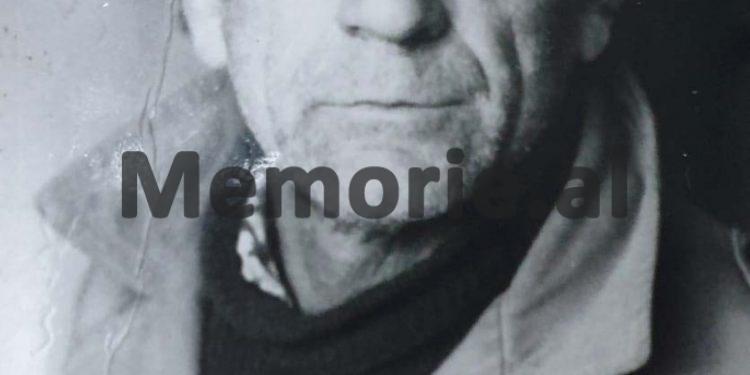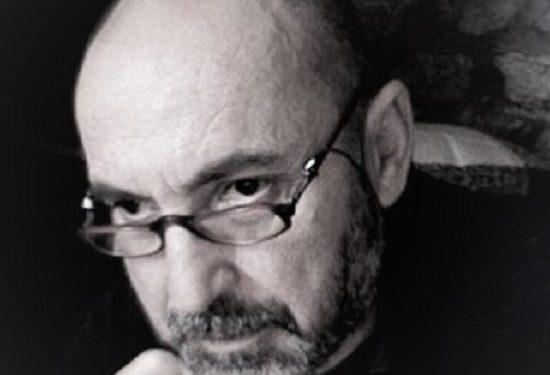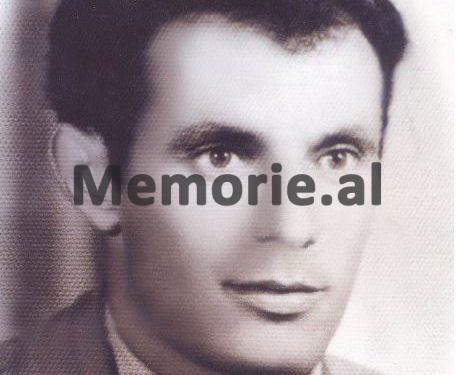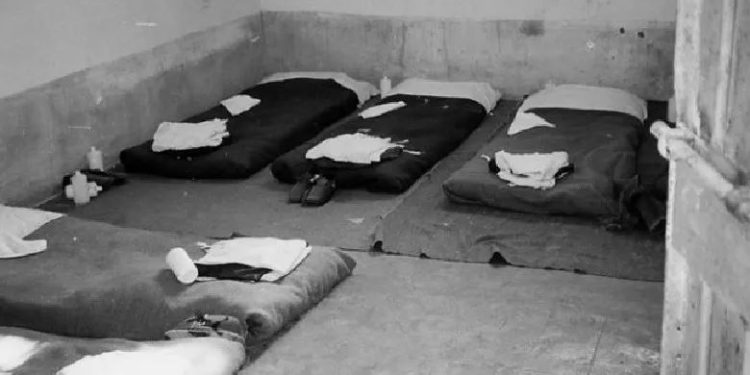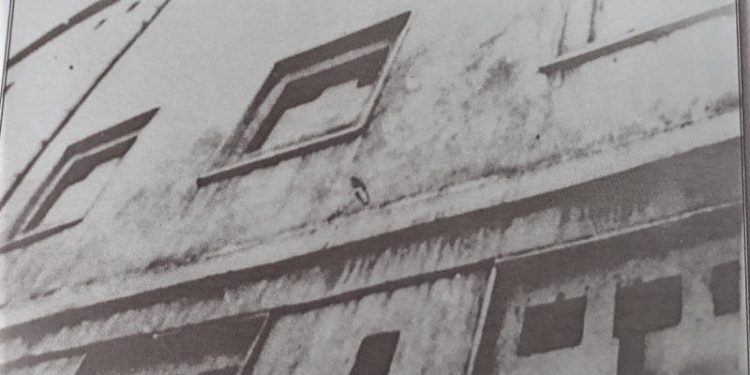By Monika Shoshori Stafa
Conversation with one of the former participants of the first anti-communist demonstration in Albania, Dede Kasneci –
Memorie.al / Invisible beyond the western line of the Great Wall, due to the border lit by electric sparks, crowds of citizens of the eastern part had gathered to listen to Reagan, in the hope that the loudspeakers would send his voice to the side as well. theirs. So this was the reason why Ronald Reagan addressed directly and personally to the Soviet leader, Mikhail Gorbachev, on June 12, 1987, with the powerful call: “Mr. Gorbachev, Open that GATE”!
Undoubtedly, the willingness of all Eastern European leaders was decisive. Only Romania was an exception to this history that was being written. Even more isolated, Albania still remained. Because more than anything else, everything had to do with the man of that time, in the individual aspect, more than the collective, was that he had to accept even in his own head, the fall of the Wall, in his life.
This was the psycho-social and equally spiritual condition in the Eastern Bloc at the beginning of 1989. The history of the revolution in Eastern Europe was not written in Washington. More than with American military power, foreign researchers connect this with the rise of Gorbachev, combined with the economic collapse of the Soviet system and the sharp contrast that was seen in relation to all the dynamics that were developing in Western Europe.
If you had heard what was happening in that part of the world from the beginning of ’88 until the end of ’89, you would understand that everything seemed to be running, following a large flock of migrating birds. At this point, the same rate of change had turned in on itself, a driving force, towards change itself.
What was happening in one country was repeated almost immediately in another country. In the space of one night, Eastern Europe was turned, subject to the whole of it, not so much a geographical process as a metaphysical one, a moving mass of plasma, in a rotating kaleidoscope, to be blinded in a surprising way, by lightning. unstoppable of a brightness of lights, from a new world. “You couldn’t imagine – write the foreigners in their notes – how Albanians lived in the late 80s”.
To what extreme poverty, the stubbornness of a clique of ruling apparatchiks brought them! The joys of life were few. They couldn’t even laugh anymore. Strong propaganda against the regime, you had created no more than an idyllic figure to worship.
He was Enver Hoxha! For almost a quarter of a century, the country lived under the foundations of a single vision, that of Enver Hoxha’s Albania, led only by Him. The Cold War was like a force-driven system.
Inertia was a state of the brain, general. Psychologists like to say that we underestimate the force of habit, but to live for almost 45 years, under this state of mind, that is, with the East in your head, against the West, them or us, it remains one of the darkest imprisonments , which happens to the brain.
From here, many years later, it wasn’t hard to see how many of us had escaped what was happening, all the little changes the world was moving towards.
But nevertheless, the winter evenings of the years ’89 – ’90, will remain in the memory of that generation, as the brightest evenings, in the worried and shocked souls of ordinary Albanians, the emotion that still breathes, that something he was breathing in the ether.
In January 1990, the first organized protest was held in Shkodër to topple the bust of Stalin. Initially, some tracts, not for the first time in Albania, against the communist regime, are mysteriously distributed in the anti-communist capital.
On January 14, 1990, the Internal Affairs bodies in Shkodra wrote that; The “enemy element” fueled by the anti-communist events in Eastern Europe and “by the rampant and slanderous propaganda of the external reaction”, had increased criminal activity against the communist regime.
This is one of the first events, starting the crack of the communist regime. It was accompanied by numerous arrests and criminal proceedings against the participants, or those who were considered organizers of these movements. On January 13, 1990, the State Security received this information, adding that; “about 200-300 people will appear in the square, in front of Stalin’s bust”.
He even has information that the organizers of this activity, among others, are Ded Kasneci and Flamur Elbasani. But what does Dede Kasneci himself say about the event, now 25 years after its occurrence, the man who was immediately arrested, after appearing in the demonstration, who was sentenced together with other friends, on the evening of January 14, 1990?
Who are you? And how did you identify yourself in communism? What was your family then, when the riots of January 1990 took place in Shkodër?
My name is Dede Kasneci. During the communist regime, I was a poor farmer, I worked at the hydroelectric plant. With a wife, with children, he supported them with bread. Nothing after the soul, thus suffering, the whole life of life. They took me to exile, for “indecent behavior in society”.
Then, when the Berlin Wall had fallen and all the countries of Eastern Europe got rid of communism, I told my friends; “By God, we remained in communism all our lives, what about us when we are moving…?!
So if you listen to me, we have to do something, it has to move me”. We went, we printed the tracts, we distributed them, we even went to the center of Shkodra. And so the story of tracts happened, in January of 1990.
What was the content of the tracts that you distributed?
We printed the tracts and distributed them in our city of Shkodër, in Vaun e Deja, in Malesia e Madhe, in Bushat and Velipojë, with the call to gather in an anti-communist demonstration on January 11.
The tracts, after being distributed, mobilized the police and the State Security. The snipers were stationed everywhere, in the Police Directorate, 5-6 others were stationed in the Tourism Hotel, up there at the top. Also, they were placed in other buildings. One bullet was enough, and good luck to everyone.
Did many people actually gather?
On the 11th, as predicted, people did not gather. Everything happened on the 14th and not a little, but the whole square was filled.
How do you remember that event?
That event has remained indelible in my memory. It seemed to me that, oh God, we were freed when we saw all those people who came out there. The great day has come, when Stalinism will disappear from this earth. We wanted to topple the bust of Stalin, which was placed by the communists, in the center of Shkodra.
But that work remained, it was not done. Reinforcements came from the police force in Tirana and the crowd dispersed. They began to call out; go away, go away, because of some recent stupidity of the communist rulers.
How did the police force treat you?
In the evening, the police forces from Tirana came to my house. They opened the door and my wife came out, with the two children in front. Five people entered the house with automatic weapons. They had black hoods on their heads, while they turned to me and said: “You are under arrest.” I told them that; what have I done that you are arresting me?! At that time I had a son about 3 years old. My house is on the second floor, I grabbed the boy by the arms and climbed to the window.
I turned to him angrily: “Outside everyone, because otherwise, as long as I’m alive, I’ll have oil” and jumped on the cement. One of them grabbed me and said; “Ded, Ded, calm down, we have no business with you.”
“Sit down – I told them, – for the sake of the children, I jumped out with the whole boy and drowned myself.” Then they sat down, and I said to the woman; inserting the door latch. A little later, I went downstairs and they kidnapped me and tied my hands and feet and from there, straight to Tirana.
Where in Tirana?
In the dungeon, of course in the dungeon, in Prison 313 of Tirana. There the director comes and says to his subordinates; “Take this savage and bind him hand and foot. Leave only a pack of cigarettes and a match to light a cigarette and that no one opens the door, from 6 in the morning until 8 in the evening.”
But I turned to him and said; “For God’s sake, director, I’m afraid that 24 hours will not pass without you being here, where I am.”
“Good, good” – he said. After the heads of all the children, I stayed there, that night passed and I took all the clothes, gathered them and put the match to them. I burned them all. The door was closed and smoke was coming out of the counter. The pressure increased greatly from the smoke and I laughed dying inside. Then I hear an automatic.
It was the siege guard. “Alert – he said, – because we were burnt inside”. After that, they came and opened the door. They took me from there and took me straight to the Psychiatric Hospital. They put a skull cap on my head and then between tortures, until I was sentenced to political prison and sent to Kosovo prison, in Dumre, Lushnja, where I stayed for about 16 months.
Did you experience the events of the students in prison or not?
I was with Kurt Kola and Fatos Lubonja in prison. Even there, we didn’t want to sit comfortably. So one day, I tell a policeman to do an errand for me and he does it for me. I prepare a written letter addressed to Pope John Paul II in the Vatican and he mails it to me. Fatos Lubonja wrote me the letter because I didn’t know how to write it.
The letter was discussed on Rai 1 and Rai 2, as well as the January 14 demonstration. Ramiz Alia had declared to the West that I had released all the political prisoners, but there were about 16 of us who were still in prison.
Me, Isuf Haluca (who was killed after ’90 on the Koman ferry), Kurt Kola and Fatos Lubonja, who were the last to be released, at the end of March 1991. After about two or three weeks, about 20 arrived himself from Tirana.
They are looking for me. Isuf Haluca from Tropoja, calls from the cell and says; “If anyone touches this man, for the soul of my mother, I will wait with my head on the cement.”
“No, we have nothing to do with him, we just want to ask him.” They asked me for details about the letter, how and with whom I had sent it to the post office?! I told them that; “I have been sentenced to prison and I have not accepted anything, I will no longer testify to such facts”.
The commissar who accompanied him, nodded to the police director and finally, he turned to me with a breath and showed me to go to my friends, to tell them that all of us, now we were free, would to get out of prison.
We came out in a group and one after the other, we approached the entrance of the prison. Azem Hajdari, Pjetër Arbnori and another person were waiting for us there. It was March 29, 1991. Memorie.al





